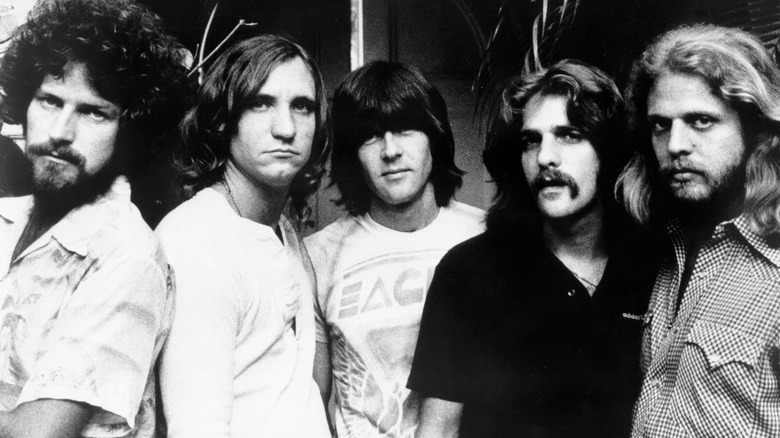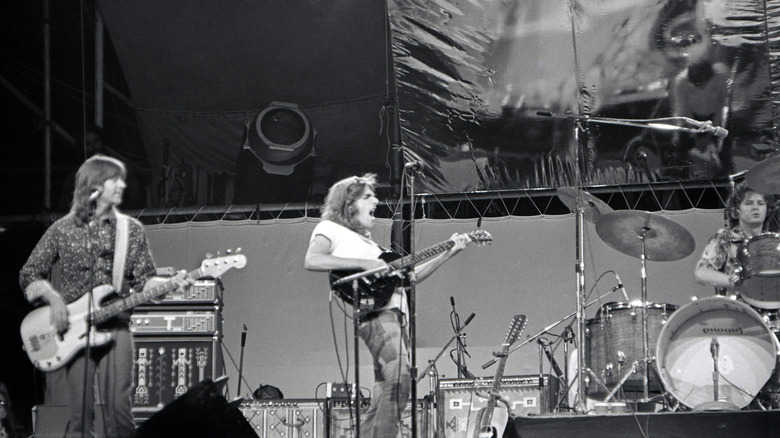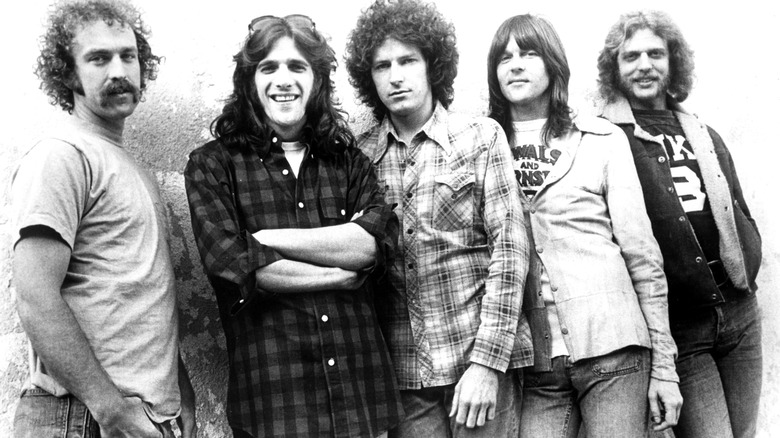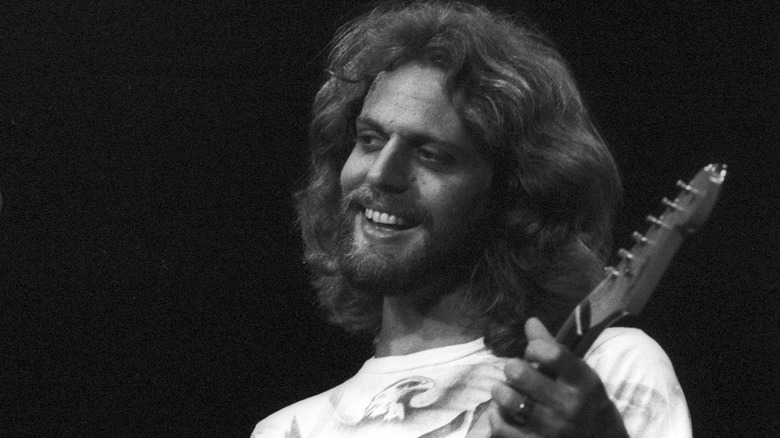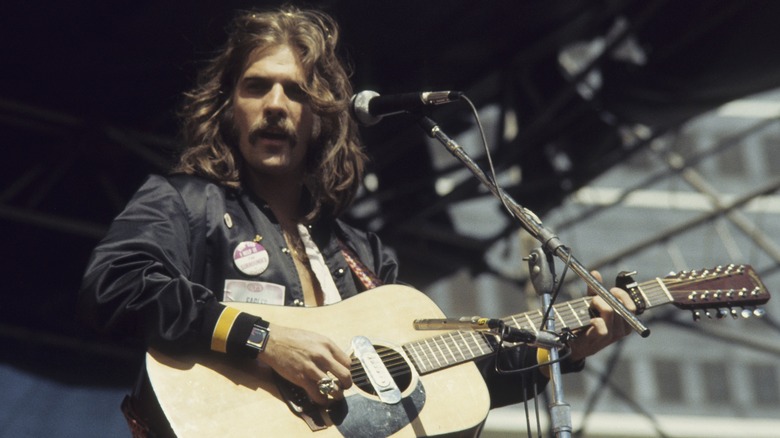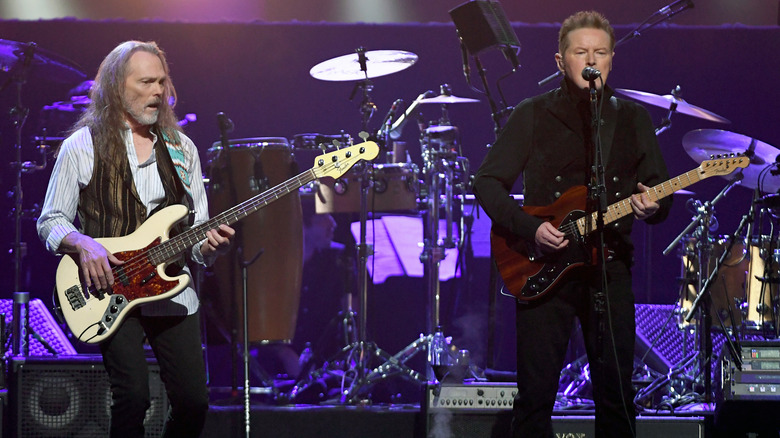How The Eagles Got Their Name
In most cases, choosing the right name is unarguably important to a band's future success. Would Nirvana have become one of the defining bands, if not the defining band, of the 1990s if they were known as "Ted Ed Fred"? Could you imagine people calling radio stations non-stop to request that new single from "Tony Flow and the Miraculously Majestic Masters of Mayhem"? You probably couldn't, but you could definitely imagine the same for that band's eventual name, the Red Hot Chili Peppers. Or how about Mookie Blaylock? One can only think of the confusion that would have risen from a hot new band from Seattle sharing a name with a star NBA point guard. Thank goodness they went with Pearl Jam.
Popular music history is littered with examples of terrible band names, and just like those aforementioned bands, the Eagles had one, too, before opting for their eventual name. We'll get to that blink-and-you-miss-it moment in the band's five-decade-plus career later on, but it's clear that the four men who made up the group's original lineup made the right choice by naming themselves after the majestic bird. It was a name tailor-made for a long run (no pun intended) of Billboard hits, but while "the Eagles" stands out for its no-frills appeal, the story (or stories) behind the name isn't quite as simple.
In the beginning: They were an unnamed backing band
The Eagles had almost supergroup-like origins when they formed back in 1971 in Los Angeles, with each member originally hailing from different parts of the U.S. Singer-guitarist Glenn Frey had previously worked alongside fellow Detroit native Bob Seger, Texan singer-drummer Don Henley moved to L.A. and recorded one album with his last band, Shiloh, Minnesota-born guitarist Bernie Leadon was briefly with Dillard & Clark and the Flying Burrito Brothers, and bassist Randy Meisner, originally from Nebraska, was one of the founding members of Poco. This was quite a collection of talent, and the people they had previously worked with were, for the most part, established names.
At that point, however, they were anything but a supergroup, as these four young musicians got their start as Linda Ronstadt's backing band. Obviously, they didn't have a name and probably didn't need a name either. But it would seem that they had something special going on, as their chemistry as a band convinced them to break out on their own and see if they could carve their niche as a standalone act. Now it could be said that they needed a name to call themselves going forward, something hopefully short, punchy, and easy to remember. That, as it turned out, was the Eagles, though as you'll find out, there are many stories and theories regarding the name's origin ... or what the band name should actually be.
The name supposedly was inspired by a trip to the desert
With a bond having been formed during their time touring with Linda Ronstadt, the Eagles started playing gigs on their own, and one of those was in Aspen, Colorado, where, in August 1971, they played under the name Teen King and the Emergencies, according to 101.9 KING. While perhaps ideal for a high school kid's garage band, that's probably not the name you expect from a group that would go on to sell millions of records and get inducted into the Rock and Roll Hall of Fame. Thankfully, it was seemingly a placeholder name, and Frey, Henley, Meisner, and Leadon would come up with something much shorter in due time.
The most often-told origin story of the Eagles' band name is that they took a trip to the Mojave Desert, where, while apparently inspired by the writings of Carlos Castaneda (among other things), they decided to call themselves as such. "There is a scene in [Castaneda's 'The Teachings of Don Juan'] in which Don Juan tells him to walk until he finds his power spot," Frey told Time in 1975. "After searching for hours, he collapses. He wakes up to find Don Juan, who laughs and tells him that he has found his spot. We all wandered around with different bands, but as the Eagles we have found our power spot."
Native American mysticism or a random sighting of actual eagles?
The desert story is far from the only one that seeks to explain how the Eagles got their band name. As documented by Far Out Magazine, guitarist Don Felder (pictured above) previously said that Bernie Leadon came up with the idea because he was inspired by how the Hopi tribe considered the eagle a sacred animal. This is an interesting claim, considering how Felder only joined the Eagles in 1974, three years after they formed. But it should also be noted that Felder and Leadon were friends well before the Eagles even became a thing, as the two attended high school together in Gainesville, Florida, and it was Leadon who introduced Felder to the rest of the band in the early '70s.
Another theory comes courtesy of J.D. Souther, who was credited as a co-writer on many of the Eagles' most memorable hits and was one-half of the country-rock duo Longbranch Pennywhistle along with Glenn Frey. According to Souther, the band name was conceived by Frey himself, who purportedly shouted the word "Eagles!" after seeing a group of eagles flying above them. Of all the stories we've discussed so far, this is easily the most random, though it would seem that the desert story, despite its questionable origins, is the one generally accepted as part of the Eagles' canon, if you can call it that. There is, however, one more origin story worth mentioning, and it comes from someone far better known for his acting than his music.
Is it 'Eagles' or 'The Eagles'?
The Eagles are one of those bands who are alternately referred to by fans with and without a "the" in front of the name. But which one is official? Telling the story in his 2007 autobiography, "Born Standing Up," actor and comedian (and occasional musician) Steve Martin wrote that the Eagles, then without a name, would hang out with him at the iconic Los Angeles nightclub The Troubadour (via Far Out Magazine). He went on to write that he suggested to Frey that the band name should be "the Eagles," though the singer-guitarist seemed adamant about dropping the article and simply going with "Eagles."
Far Out Magazine speculates that Frey's insistence on calling his band "Eagles" lends credence to the aforementioned story from Souther where he claimed that Frey was inspired by the sight of actual eagles in flight. And while (the) Eagles were ahead of the curve by eschewing the word "the" despite having a plural band name, that hasn't stopped many fans from including the article — "I got tickets to the Eagles' concert," after all, arguably rolls off the tongue better than "I got tickets to Eagles' concert." Heck, even Frey slipped during his conversation with Time and referred to the band as "the Eagles."
Regardless of its origin, the name meshes with their image
At the end of the day, it doesn't really matter whether you believe the desert story, the Hopi story, or the literal "Eagles!" story when it comes to the origin of the legendary group's name. It's likewise irrelevant whether or not you prefer to add "the" before "Eagles." As pointed out by Far Out Magazine, the name is a perfect match for their image as the quintessential American rock band — they were four guys from different home states who got together in California and embarked on a wildly successful career despite all the drama they dealt with in the years since they formed. Furthermore, the bald eagle is America's national bird, so what better band to represent the red, white, and blue than one that's (partly) named after this creature?
Despite Glenn Frey's death in 2016, the Eagles are still going strong, with the late musician's son, Deacon Frey, taking over from his father. It should go without saying that there's no reason they should even think of changing their name. It's rightfully become an iconic one, not just because of the symbolism, but also because of its simplicity, easy recall, and evergreen nature. Let's face it — it just wouldn't sound right for a band of men in their 70s (save for Deacon Frey) to be calling themselves "Teen King and the Emergencies."
